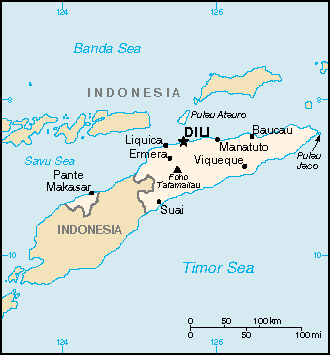Map:

Overview:
The Portuguese began to trade with the island of Timor in the early 16th century and colonized it in mid-century. Skirmishing with the Dutch in the region eventually resulted in an 1859 treaty in which Portugal ceded the western portion of the island. Imperial Japan occupied East Timor from 1942 to 1945, but Portugal resumed colonial authority after the Japanese defeat in World War II. East Timor declared itself independent from Portugal on 28 November 1975 and was invaded and occupied by Indonesian forces nine days later. It was incorporated into Indonesia in July 1976 as the province of East Timor. An unsuccessful campaign of pacification followed over the next two decades, during which an estimated 100,000 to 250,000 individuals lost their lives. On 30 August 1999, in a UN-supervised popular referendum, an overwhelming majority of the people of East Timor voted for independence from Indonesia. Between the referendum and the arrival of a multinational peacekeeping force in late September 1999, anti-independence Timorese militias - organized and supported by the Indonesian military - commenced a large-scale, scorched-earth campaign of retribution. The militias killed approximately 1,300 Timorese and forcibly pushed 300,000 people into West Timor as refugees. The majority of the country's infrastructure, including homes, irrigation systems, water supply systems, and schools, and nearly 100% of the country's electrical grid were destroyed. On 20 September 1999 the Australian-led peacekeeping troops of the International Force for East Timor (INTERFET) deployed to the country and brought the violence to an end. On 20 May 2002, East Timor was internationally recognized as an independent state.
The People:
Population: 1,040,880
note: other estimates range as low as 800,000 (July 2005 est.)
Age structure:
0-14 years: 37.1% (male 196,108/female 189,753)
15-64 years: 59.9% (male 318,173/female 305,479)
65 years and over: 3% (male 15,353/female 16,014) (2005 est.)
Religions:
Roman Catholic 90%, Muslim 4%, Protestant 3%, Hindu 0.5%, Buddhist, Animist (1992 est.)
Government Type:
Republic
Leader(s) to pray for:
chief of state: President Kay Rala Xanana GUSMAO (since 20 May 2002); note - the president plays a largely symbolic role but is able to veto some legislation; he formerly used the name Jose Alexandre GUSMAO
head of government: Prime Minister Mari Bin Amude ALKATIRI (since 20 May 2002)
Source: The World Factbook
View All Countries